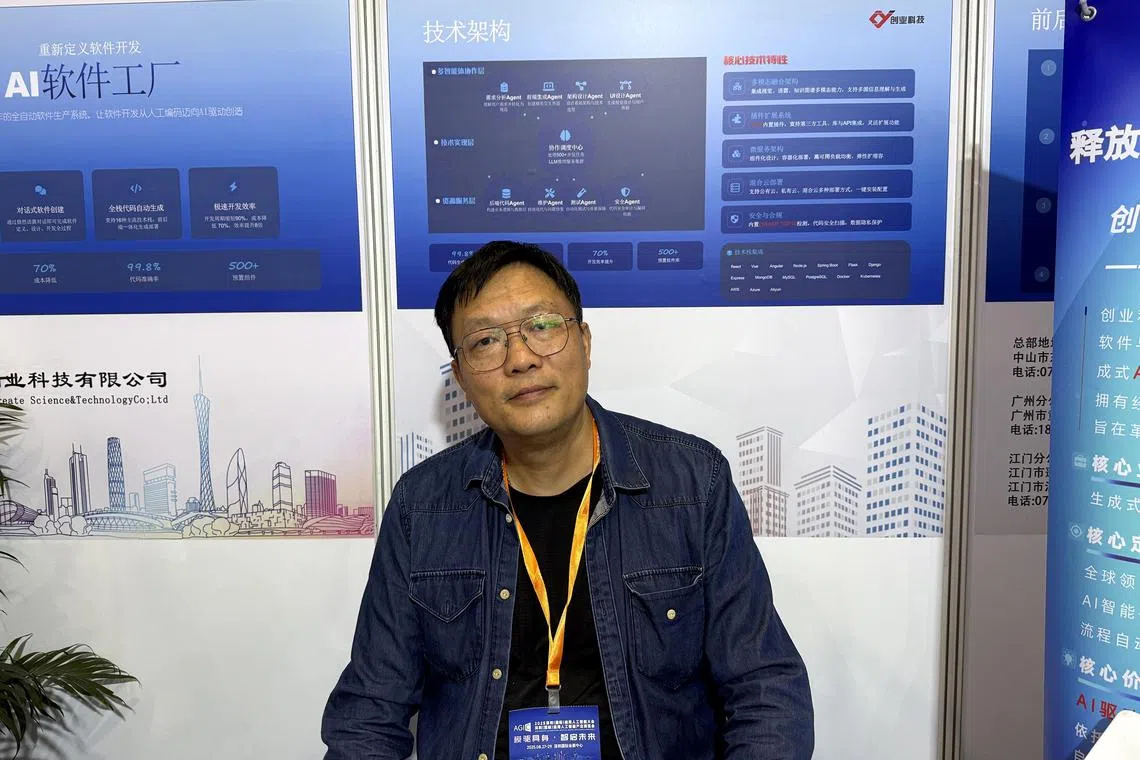‘Why wouldn’t people use it?’: More Chinese firms embrace AI as Beijing pushes for wider adoption
Sign up now: Get insights on Asia's fast-moving developments

At software company Guangdong Create Science And Technology, AI agents now write the lion's share of software, says chief AI officer Huang Qijun.
ST PHOTO: JOYCE ZK LIM
- Chinese firms are rapidly adopting AI agents to boost productivity and cut costs.
- AI adoption varies; some firms see it as revolutionary, while others are cautious due to concerns about accuracy.
- AI agent market growth is expected to reach 10.9 billion yuan in 2025.
AI generated
SHENZHEN – A revolution of sorts is taking place at a Guangdong software development firm.
In just three months, Guangdong Create Science and Technology has produced some 50 software systems, up from an average of one or two per year, said Mr Huang Qijun, the firm’s chief AI (artificial intelligence) officer.
This is all thanks to an army of AI agents, designed to autonomously replicate what the firm’s software engineers do at each stage of the development process.
Rolled out in May, these agents can do in a matter of hours or days what would have taken humans months. “And you don’t have to pay them a salary,” said Mr Huang.
The use of AI has given the firm a clear edge over its competitors, he said. The company can now slash prices by some 70 per cent, and submit tender bids with a version of the requested software already enclosed.
“This is a revolutionary thing,” he said. “Why wouldn’t people use it?”
Mr Huang’s firm is one of a growing number of businesses applying AI to their workstreams, as China ramps up efforts to diffuse a technology seen as a way to turbocharge the economy.
Some 53 per cent of 226 Chinese companies say they are integrating AI across multiple workflows – 11 percentage points higher than the global average, according to a May 2025 survey by consulting firm Accenture.
Still, the government has loftier goals. It released in late August a road map to accelerate the integration of AI across China’s economy and society, an initiative known as “AI Plus”.
It wants the adoption of AI agents and intelligent devices to exceed 70 per cent by 2027, and 90 per cent by 2030. More advanced than chatbots, AI agents can automate complex tasks and take actions to achieve goals with minimal human supervision.
Industry players and analysts whom The Straits Times spoke with say that China’s adoption of agentic AI has risen steadily this year.
The country’s market for AI agents is expected to quadruple from 2024 to reach 10.9 billion yuan (S$1.96 billion) in 2025, according to an August projection by Hap Academy, a Beijing-based tech industry think-tank.
Chengdu Minto Technology, a developer of AI agents, has seen demand for its products rise by 30 per cent to 40 per cent in 2025, said deputy general manager Zhou Bo.
“Now, many organisations are actively embracing AI, and are starting with small applications and use cases,” he said, adding that most of his customers were government bodies and businesses.
A Suzhou-based gas company, for example, had engaged Mr Zhou’s firm to develop agents that could traverse its internal systems to provide status updates on how projects were progressing, and highlight choke points if any.
Some government agencies, he said, were also tapping agents that put together reports by analysing data from multiple bureaus.
To further boost sales, Mr Zhou’s company packages some of its AI agent software together with hardware – as Chinese buyers are generally more willing to pay for the latter than the former, he said. “If you buy a piece of software, you feel like you can’t really see anything. But if you buy hardware, it’s right there.”
One such offering is a water-bottle-size cylinder housing a digital Chinese fortune god, to which people can pose questions. Its price tag of 1,999 yuan comes with a subscription to the company’s proprietary agentic AI software, which would otherwise command just a few hundred yuan.

Chengdu Minto Technology’s cylinder which houses a digital Chinese fortune god.
ST PHOTO: JOYCE ZK LIM
Even as more Chinese companies warm to AI, attitudes to this nascent technology vary widely, from sceptics to fervent adopters, said Mr Cao Kaibin, president of Hap Academy, which surveyed about 100 firms in 2025 on their use of AI.
He estimated that about 30 per cent of Chinese businesses were experimenting with the use of AI, while about 5 per cent were raring to use the technology to get ahead of their competitors.
Firms that invested the most in AI agents were in the finance, software and internet, and manufacturing industries – sectors where their use cases are most clearly defined, he said.
Many of the most enthusiastic adopters of AI, he added, were small companies whose operations were more nimble, and were “more willing to try it out even though there might be risks”.
At the Guangdong-based software company, for instance, Mr Huang is not fussed about handing over the lion’s share of software-writing to AI agents.
His engineers inspect the software before submitting it to customers, he told ST. “And at the end of the day, when the customers check it upon delivery, they will know whether it passes their requirements or not.”
Still, the “vast majority” of companies, by Mr Cao’s estimate, adopt a wait-and-see attitude towards AI. A key concern, he said, is that the technology is still not accurate enough for firms to fully trust.
For now, just a small fraction of Chinese firms report sizeable gains from using AI.
In a report released in July, Accenture found that only 9 per cent of the 163 Chinese firms it surveyed saw significant growth in productivity, revenue or profits as a result of AI adoption.
Mr Meng Yin, founder of Shenzhen The Nine’s Light Technology, a start-up that sells AI agents, said one issue which firms face when seeking to use the technology is a lack of clarity on what exactly they need.
As AI use rises in China, questions arise about what this will mean for an already weak job market. In July, China’s youth unemployment rate reached 17.8 per cent – its highest level since August 2024.
Ms Wu Manhua, whose Guangzhou-based firm uses AI agents to help companies analyse risks and opportunities in the intellectual property space, said that reports which once could take up to a week to write can now be done in several hours.
And while her firm continues to hire research and development personnel, she reckons that its demand for administrative staff, including customer service officers who write these reports, will drop significantly.
“Normally, you’d need about 10 or 15 people to serve 100 companies,” she said. “But with AI... perhaps one or two will do.”



